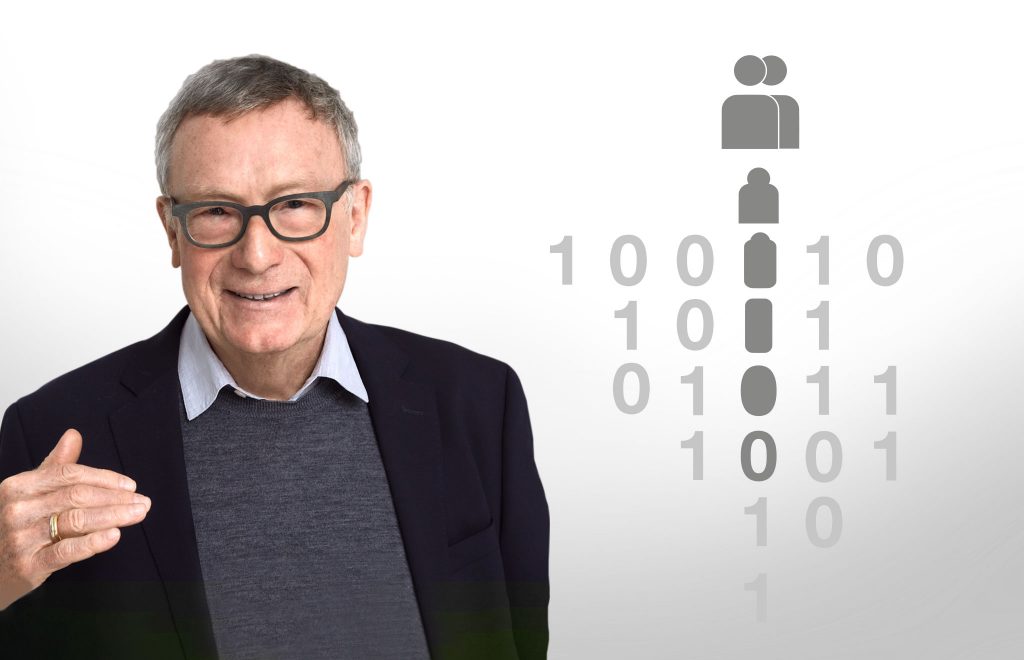
With the outbreak of the global pandemic, people are turning more and more to digital solutions. The number of hours which we spend on our digital devices has increased significantly. We are getting used to a certain level of convenience (e.g., working at home). Meanwhile companies are closing offices and businesses because they expect a higher turnover from online business. How will the world look after the pandemic?
In her latest Duet Interview with Peter Wippermann, a researcher in emerging trends, Dr Caldarola, author of Big Data and Law, discusses the changes in our social lives.
With every click in the social media – whether it is to book a vaccination or to order a meal – people are leaving their digital footprints. With the help of profiling software, a digital twin of an actual person is being created. Since our social and professional lives are hardly possible nowadays without using digital solutions, is our digital twin/clone unavoidable? Is anonymity even possible in today’s world?
Peter Wippermann: The simple fact of using the internet means we automatically produce individual data profiles on the various platforms and data banks. Without personal data it would not be possible to tailor individual services, products, access rights, authorization and collaboration in the data sphere.
The digital twin of a person would only be created when information from various data sources were put together. A true digital twin would only really be possible in an alternate universe, a sort of collective virtual space of all digital worlds which until now only exists in the science fiction novel Snow Crash.
During the pandemic, digital games have become particularly popular. People play with their avatars in this venue, meaning a digital creation which they themselves have made and enhanced by, for example, dressing it, giving it tasks, in short, making a profile for it. Companies see potential for a new market in this development. They have begun not only selling actual fashion to people, they also provide digital clothing for the avatars on the internet- at a price of course. Are we seeing the creation of new markets? Or can we expect the currently existing markets to simply become part of the digital world?
Virtual fashion has indeed become popular during the pandemic. Luxury fashion industries have become pioneers in this new field. As a result of this development, the priorities of sales and marketing have shifted from the real world to the virtual one of games.
Louis Vuitton was among the first to offer virtual fashion and since 2019 has been working together with Riot Games, the developer of the computer game, “League of Legends “. In this way, the prestige skin for Qiyana which was designed by Nicolas Ghesquière, Artistic Director of the LV Ladies Collection, is virtually available in the “League of Legends “Store and can also be purchased as an actual Louis Vuitton fashion item.
What is the relation between a real person, his digital twin and his avatar? Could we say that we all have three identities? What challenges do you think having these various personas means for us? Are heading for some sort of personality disorder? Is it appropriate to speak of “digital schizophrenia”?
Media have developed from information and communication to participation and finally to immersion. Augmented reality, virtual reality and holograms are going to be seen as a natural part of our daily lives in the years to come and will become increasingly visible. People and consumers are going to use these virtual realities, just as we have become accustomed to the internet in the last thirty years without developing digital schizophrenia.
Acceptance of new digital worlds has been accelerated during the COVID pandemic and can be particularly well observed in the fitness industry. Peloton offers a cardio bicycle with live workout courses via video streaming and has become so successful that it is simply not able to keep up with the demand. “Mirror” from Lululemon already offers the next level in evolution: ” THE smart home gym”. A full-sized mirror is also a computer interface and becomes a personal trainer owing to artificial intelligence and machine learning. Zwift goes one step further by combining fitness with gaming and community. In this way, you can ride your stationary bicycle and compete with friends all over the virtual world.
Does a person identify himself/herself with his/her digital twin and his avatar?
Most people find digital profiles of their own identity rather frightening. Europeans users of interactive products expect to be protected by laws, such as the GDPR, which guarantee their basic right to privacy. But if we look at the US or China there are no comparable laws there. And just a reminder: the global providers of digital services are not based in Europe.
It’s a different matter altogether if we look at avatars. In this case, people develop emotional attachments to their virtual selves.
Even in the real world you can find more and more prosthetics for people containing a digital component. It will soon be possible to attach an artificial eye which is really a video camera to the optic nerve, thus enabling the visually impaired to be able to see. This type of technology is a mixture of the actual world and a world which is always reproducing itself because the artificial eye is capable of repeating what happened innumerable times because any event can simply be stored and re-played at will. What sort of challenges will we be facing, especially if one imagines that these recordings can be reproduced and changed?
The right to your own image is going to have to be reconsidered. Personal perceptions and reproducing your own impressions by means of medical prosthetics will need federal protection.
People are active both in the real and in the digital world. Which sphere is influencing the other?
The virtual world is changing the analog world. Just as our individual mobility has altered our daily lives and even cities because we drive cars now, so too will our consciousness, our social relationships, our working environment and our society as a whole be changed by a sort of immersion, meaning being present in virtual realities. After the advent of smart phones, we will experience augmented reality glasses as the next hardware platform.
Today’s generations use digital tools in different ways and with varying degrees of intensity. As we have seen, the older members of our populations have been experiencing difficulties registering online for their COVID vaccination, with some resorting to their grandchildren for help. We see a similar trend at schools with some older teachers being reluctant to work with computers and having difficulties staying on top of new digital pedagogical methods. How is the digital revolution being experienced by the different age groups? How are the various generations managing despite their deficits or advantages in this area? What conflicts can we expect to see?
Those who have grown up with new technological advances will consider them as the most natural thing in the world. Accepting virtual worlds begins in a child’s bedroom. Instead of playing with building blocks in the sand box, kids are building new worlds by playing Minecraft. Lego is combining traditional building components with augmented reality and enables individual computer games on mobile phones. By the time they are ten years of age, 75% of children already have a mobile phone, two years later the figure stands at about 95%. For this generation having permanent access to a mobile internet and new virtual rooms is self-evident. For this reason, reverse mentoring makes sense: the young are coaching the old.
Not everyone wants a digital twin or their own avatar. Anonymity is still a right. Will anonymity become a luxury item?
My opinion is:
“Whoever is not locked in, will be locked out.”
Peter Wippermann
Anonymity in the digital sphere will develop into a premium service that needs to be paid for. Only the future can reveal what will happen as far as identity management, and the conscious managing of identity, anonymity and pseudo-anonymity are concerned.
Mr Wippermann, thank you for sharing your insights on the value of data.
Thank you, Dr Caldarola, and I look forward to reading your upcoming interviews with recognized experts, delving even deeper into this fascinating topic.
